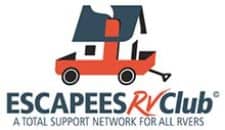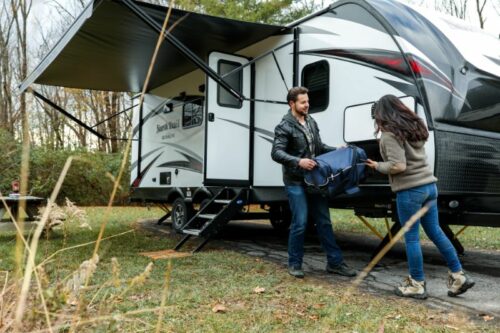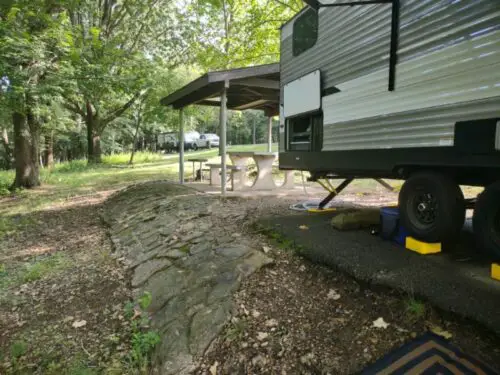My first thought: For peace of mind and to preserve sound relationships with friends and family, do not lend your RV—for a trip—to anyone! The best excuse (true or not) is: “My insurance (or financing) does not permit it.”
Having said that, there may be no legal restrictions to prevent you from lending your camper. To be sure, check your insurance and financial loan documents. Insurance coverage is likely limited to the named owners and operators of the RV.
Do not charge or accept any money for the use of the trailer. This would be viewed as a business and your insurance would likely be null and void—no coverage at all.
Who typically initiates the conversation to borrow/lend a camper? Based strictly on casual observation, an owner is more likely to offer to let someone use a camper versus someone asking to borrow the camper.
Keep in mind that those who will want to borrow your camper may not be experienced campers. They may not even know how to light a gas burner on the stove, turn on the heat, operate the toilet, or know about emptying holding tanks. As the owner, you will need to know what to explain to newbie campers and how to answer questions—how and why—when asked.
Considerations and Risks of Lending an RV to a Friend
Can you lend your RV to a friend, or may you borrow an RV from a friend? The simple answer is “you may lend or borrow” a camper—but there may be considerations or restrictions to review before hitching up.
There are at least three different scenarios for loaning your camper.
Scenario 1: You Set It Up, Don’t Move It
The person(s) will use the camper for a defined period—e. g., for a visit or while they transition from one home to another. The camper may be adjacent to the owner’s home, on the borrower’s property, or in another mutually acceptable location. As the owner, you will position and set up the camper for the user. The guests will NOT be towing or moving the trailer.
Letting someone use your camper may be a new experience for you, too. Even though you are familiar with the operation of your camper, do not assume that your guests are equally familiar.
Modern travel trailers and recreational vehicles have unique features that non-campers may not understand. Simple items such as hooking up electrical, water, and sewer services may be a new experience for the borrower.
Demonstrate the operation of all of the camper’s features they are likely to use including heat and air conditioning, water (fresh, gray, and black) levels, gas stove, refrigerator, air conditioning and heating, the awning, television, and any other unique features that are installed.
Make sure everyone knows how to operate the toilet!
Scenario 2: They Set It Up, But Don’t Move It
You will tow and set up the camper for the guest’s use and retrieve it when it is no longer needed. The location may be the site of a new house being built or a vacation spot. The guests will not be towing or moving the trailer. The owner should make sure that the guests know how to operate all camper systems correctly.
We recommend taking interior and exterior photos of the camper before lending it to anyone for any reason. We allowed one couple to use our camper for several weeks, parked next door to our home. After they moved out, we discovered that the floor of the shower was cracked and broken.
In a second instance, our guests had a medium-sized dog. He was gentle and friendly. What I did not realize was that he had sharp, strong claws that punctured and tore the vinyl on the dinette seating.
In most areas in the United States, you may not rent the camper for a fee unless you have the appropriate rental licenses and insurance. Bottom line, it is not advisable to lend or borrow a camper without fully understanding the risks and your insurance coverage.
Scenario 3: They Use It, Move It
The camper will be used for several weeks, being pulled or driven by the borrowers to one or more destinations. This would require notifying the insurance carrier, and maybe adding additional user insurance. The owner should make sure that the guests know how to operate all camper systems correctly, including everything related to hitching, towing, and controlling the trailer including backing it into a camping site.
We avoid lending the camper to anyone who wants to take it on the road. I can think of only two or three people I would even consider lending the camper for such a trip. If you do allow someone to take the camper on a trip, travel adds to the number of items you must explain, demonstrate, or caution the borrowers about.
In this case, we recommend making up a detailed guide/checklist of things to do to hook up and disconnect at a campground. Make a point of explaining the difference between black water and grey water. Remember, this is your trailer. If they want to use it, they must give you the courtesy of paying attention to basic instructions.
Items you must cover with anyone you are going to allow to drive away with your camper.
- Proper hitching of the vehicle to the camper, including the hitch, safety chains, trailer brakes and checking the operation of brake lights, turn signals, and marker lights. Also go demonstrate using chocks, leveling blocks, the tongue jack, and stabilizing jacks to level and secure the camper.
- Practice backing: This can be a real challenge for drivers new to trailers. Emphasize backing very slowly, having an observer visible, and paying attention to side mirrors.
- Turning and using the side mirrors, especially on tight corners, so that the trailer does not run off the road or over curbs.
- Leveling the camper and chocking the wheels.
- Proper hookup of water, sewer, and electricity.
How We Learned the Hard Way When Renting Our Camper to a Friend
A professional couple we knew were in the process of relocating. We “offered” them our camper, set up on our property, as temporary housing. We spent some time showing them how everything worked.
After they moved out, I anticipated a degree of cleanup but had not anticipated that the shower floor would be cracked or all the scratches and minor gouges in the table and countertops. And it took a little effort to get the dog odor out of the camper.
Another couple used the camper while visiting us. It would have gone well except they too had a dog. With no fencing around the yard, they had to keep the dog in with them at night. They left behind several rips in seat cushion covers created by the dog’s claws and the doggie odor.
>>> READ MORE: 15 Mistakes When Renting an RV
Conclusion
If you allow someone to use your camper, make it clear you expect them to follow the instructions you provide and make sure they know how to contact you if they have questions … then lie awake at night and worry!
Jeffrey Richmond
Jeffrey Richmond is an RV owner and contributing author to ChanginGears.com










